When it comes to the world of running shoes, Brooks and Asics are two popular brands in the industry.
In this comprehensive article, we talk about the differences and similarities between Brooks and Asics running shoe brands.
By digging into the detailed features, technologies, and design philosophies that set these brands apart, we aim to guide you toward making an informed decision tailored to your running needs.
A Clash of Titans: Brooks vs Asics
In the vast realm of running shoe brands, Brooks and Asics have emerged as household names, sparking debates over which brand offers superior running shoes.
This discourse, however, necessitates a nuanced perspective.
Rather than seeking to crown a definitive champion, our journey through the world of Brooks and Asics running shoes is geared toward highlighting their unique attributes, enabling you to make a choice that aligns with your individual preferences and performance objectives.
You May Also Like – HOKA Or Brooks Which Brand is Best for You?
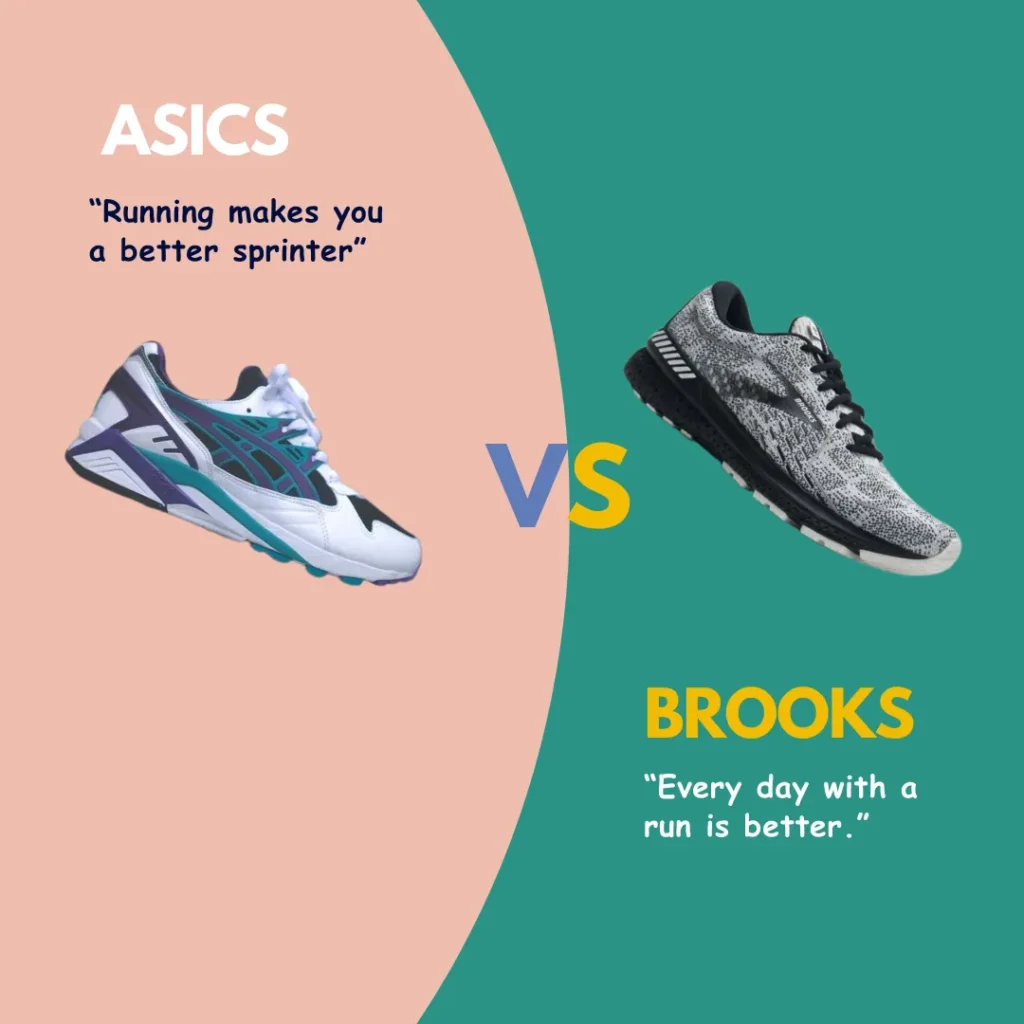
Market Size Comparison – Brooks Vs Asics
The global running shoes market size was USD 14,850 million in 2020 and is expected to reach USD 20,580 million by the end of 2027, with a CAGR of 4.9% between 2021 and 2027.
Embracing Individuality: The Philosophy of Brooks and Asics
Brooks and Asics have both earned the coveted endorsement of the American Podiatric Medical Association (APMA), a testament to their commitment to crafting footwear that aligns with podiatric health and quality standards.
As we navigate the Brooks vs Asics terrain, it’s essential to remember that these brands excel in distinct ways, and the key lies in understanding how they cater to the diverse needs of runners.
You May Also Like – Brooks Ghost vs Brooks Adrenaline GTS: A Comprehensive Comparison
Decoding Design Distinctions
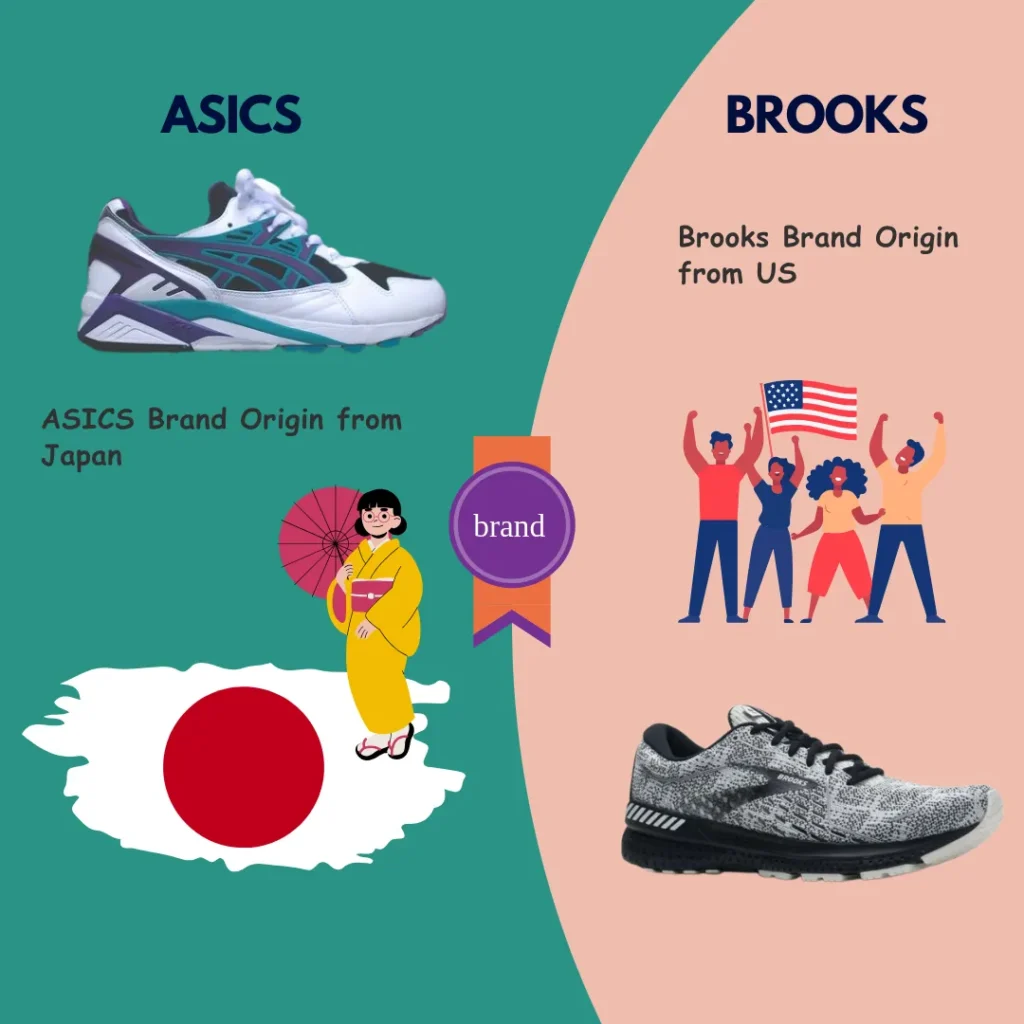
Brooks: A Focus on Foot Comfort
Brooks approaches shoe design with a laser focus on comfort and tailored support.
One of their standout features is the DNA cushioning technology, which adapts to your unique stride, offering a personalized cushioning experience.
This is complemented by the GuideRails support system that aids in maintaining a natural motion path while reducing the risk of excessive movement that can lead to injuries.
Also Read – HOKA vs ASICS: Which Brand is Best For You?
Asics: Where Cushioning Meets Stability
Asics takes pride in merging cushioning and stability seamlessly.
Their GEL technology, a hallmark of their shoes, delivers responsive cushioning that absorbs impact shock, offering a smooth and comfortable ride.
This is especially advantageous for runners seeking a blend of cushioning and stability during their runs.
The Shoe Chronicles: Brooks vs Asics Models
Both Brooks and Asics offer an extensive range of running shoe models, catering to various running styles and preferences.
Brooks boasts an array of options, from neutral running shoes like the Ghost series to stability-focused choices like the Adrenaline GTS series. Similarly, Asics provides options such as the Gel-Kayano series for overpronators and the Gel-Nimbus line for neutral runners.
This breadth ensures that runners can find the perfect fit for their unique needs.
Endurance and Longevity
Durability is a vital consideration when investing in running shoes.
Brooks recommends replacing their shoes after 300 to 500 miles, while Asics shoes are designed to endure 450 to 500 miles.
This difference suggests that Asics shoes are built for longevity, a testament to their quality construction and materials.
The Fit Factor: Brooks vs Asics
A notable contrast between the two brands lies in the fit of their shoes.
Brooks running shoes generally feature a wider toe box, accommodating natural foot splay during running.
Asics, on the other hand, tend to have a narrower fit, offering a snugger feel.
This distinction influences not only comfort but also performance, making it crucial for runners to choose based on their foot shape and preferences.
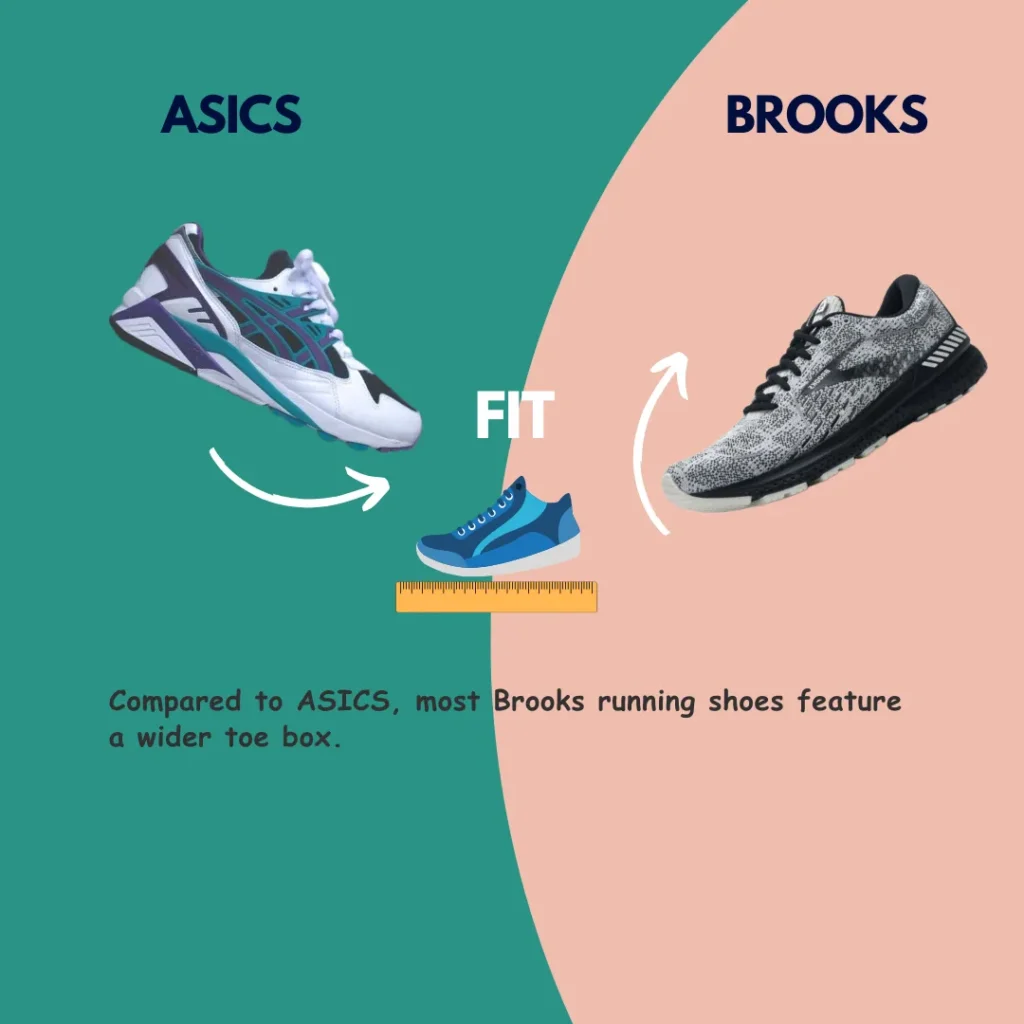
Cushioning and Feel: A Delicate Balance
In the realm of cushioning, Brooks and Asics take divergent paths.
Brooks employs various foam materials tailored to different purposes, with options like DNA LOFT for plush cushioning and DNA AMP for energy return.
Asics, meanwhile, relies on GEL technology for enhanced cushioning and shock absorption.
This dichotomy in cushioning technologies translates into distinct running experiences, with Brooks offering responsiveness and Asics providing a cushier feel.
Stability Unveiled
For runners seeking stability, both brands offer solutions.
Brooks integrates GuideRails technology to support natural running strides, while Asics employs an external heel clutch and a Duomax midsole for stability.
It’s worth noting that both approaches aim to accommodate and optimize gait, ensuring a smoother and more controlled running experience.
The Journey of Fit and Feel
In the realm of fit and feel, Brooks and Asics reveal their distinctive philosophies.
Brooks shoes, with their wider build, offer a responsive and light feel, complemented by permissible foot movement.
On the other hand, Asics shoes exude a cushioned sensation, owing to the GEL technology.
This cushioning contributes to a snugger fit that enhances control and support.
Also Read – Do Asics Run Small, Big, or True to Size? Unveiling the Perfect Fit
Pricing Parity
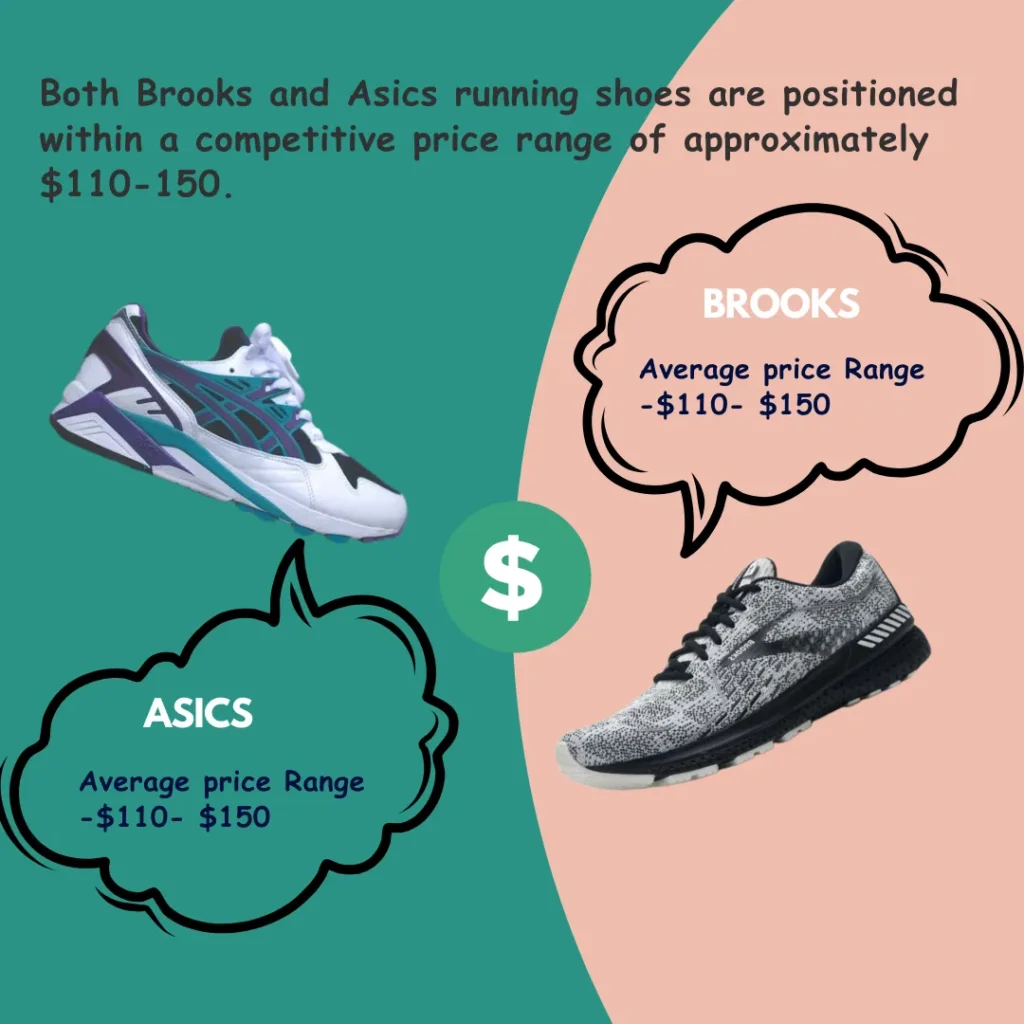
Both Brooks and Asics running shoes are positioned within a competitive price range of approximately $110-150.
This pricing reflects the commitment of both brands to delivering quality products at reasonable costs, ensuring that runners have access to premium footwear without breaking the bank.
Now, picking a favorite between Brooks and ASICS is a bit like choosing your favorite flavor of ice cream – it really depends on what you’re looking for.
Brooks is praised for its emphasis on cushioning and support, making them a go-to choice for runners who want that extra comfort, especially on longer runs.
They often have a snug fit and excellent arch support, which can be a lifesaver if you tend to overpronate or need added stability.
On the other hand, ASICS has its own dedicated fanbase thanks to their innovative gel cushioning technology.
This can be a game-changer if you’re concerned about impact and joint protection.
ASICS shoes are also known for their durability and versatility, making them a solid choice for both beginners and experienced runners.
But here’s the thing: the perfect shoe for you depends on factors like your running style, foot shape, and personal comfort preferences.
I’d recommend heading to a specialized running store where they can analyze your gait and help you find the ideal pair.
So, whether you lean toward Brooks’ plushness or ASICS’ gel-infused comfort, remember that what matters most is how those shoes feel on your feet as you hit the pavement.
Read Also – Unveiling the Price Tag: Why Are ASICS Shoes So Expensive?
Are Brooks better than Asics in running shoes?
The truth is, whether Brooks or Asics is better for you depends on a few factors, and it can vary from person to person.
Let’s break it down:
Both Brooks and Asics are renowned brands in the running shoe world, and they both have their strengths.
Brooks is known for its comfortable fit and wider toe box, which can be a game-changer if you have broader feet or prefer a bit more room for your toes to wiggle.
Asics, on the other hand, is famous for its gel cushioning technology, which provides excellent shock absorption and is favored by many runners for its impact protection.
When choosing between the two, consider your personal preferences and running style.
If you’re looking for a plush, comfortable ride with a roomy toe box, Brooks might be your go-to.
On the flip side, if you need top-notch cushioning and impact protection, Asics could be your best bet.
Ultimately, the “better” brand comes down to what feels most comfortable on your feet during your runs.
It’s always a good idea to try on both and see which one suits you best.
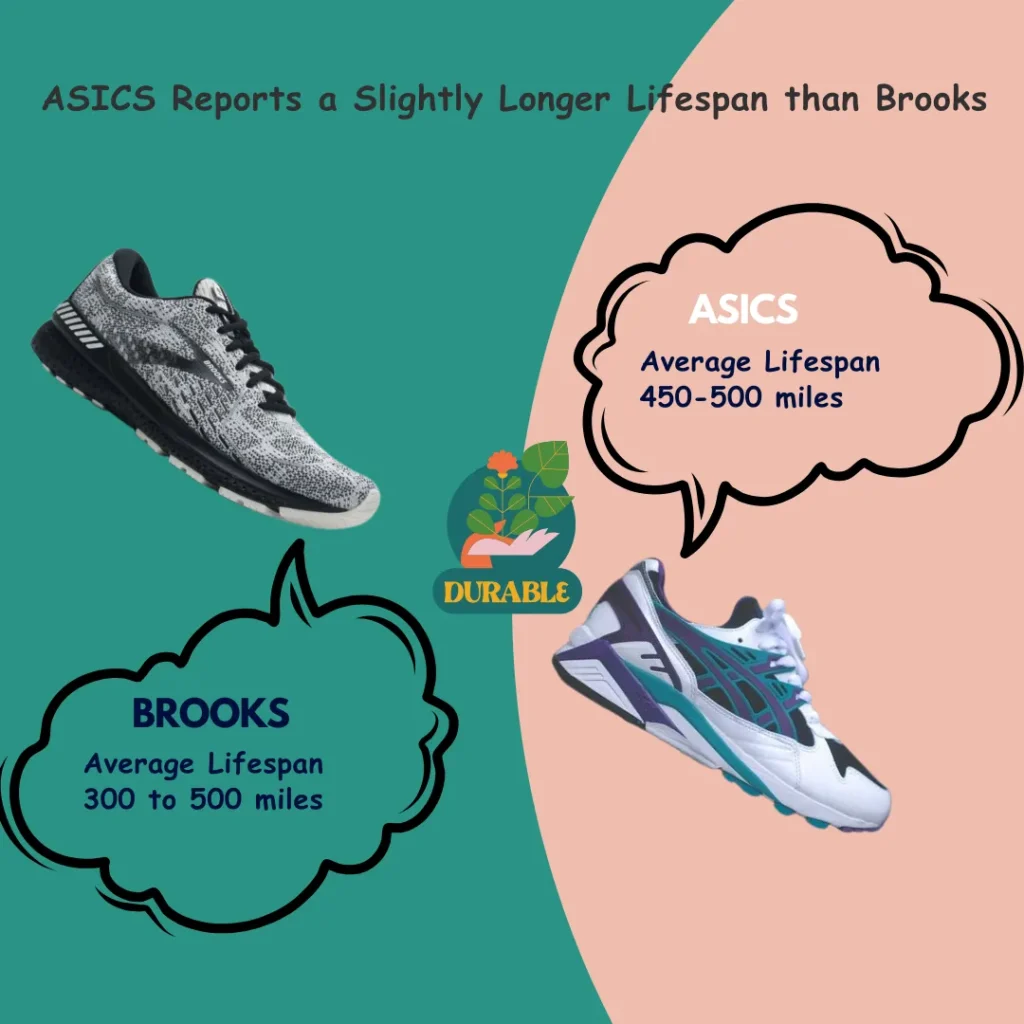
Also Read – Asics Nimbus 25 vs Asics Cumulus 25: An In-Depth Comparison
Concluding the Brooks vs Asics Odyssey
As we navigate the intricate terrain of Brooks vs Asics running shoes, we find ourselves at a juncture of choice rather than rivalry.
The two brands, while sharing common ground as esteemed running shoe manufacturers, excel in distinct arenas.
The selection between Brooks and Asics hinges on a holistic understanding of your biomechanics, preferences, and running goals.
In the tapestry of running, Brooks and Asics stand as vibrant threads, each contributing unique hues to the canvas of your running journey.
While we don’t seek to declare an overarching victor, we offer a compass of information to help you steer your course toward the running shoe brand that resonates with your stride, gait, and aspirations.
Read Also – ASICS Novablast 3 vs ASICS Dynablast 3: A Comprehensive Comparison
FAQs – Brooks vs Asics Running Shoe Brands
What are the main differences between Brooks and Asics running shoes?
Brooks and Asics are two well-known brands in the world of running shoes, and they each have distinct characteristics.
The primary differences between them include fit and comfort, cushioning technology, price range, durability, and target audience.
How does the fit and comfort of Brooks compare to Asics?
Brooks is often praised for its roomier toe box, which provides more space for your toes to move comfortably.
This can be particularly beneficial for runners with wider feet or those who prefer a bit of extra room.
Asics, on the other hand, tends to offer a snugger fit, which can be advantageous for runners who want a more secure and close-fitting shoe.
What is the difference in cushioning technology between Brooks and Asics?
The cushioning technology used by these brands differs significantly.
Brooks commonly utilizes polyurethane in its midsoles, which delivers a responsive and cushioned feel.
Asics, on the other hand, is renowned for its Gel cushioning system, providing exceptional shock absorption.
This makes Asics a preferred choice for runners seeking superior impact protection.
Are there variations in the price range between Brooks and Asics running shoes?
Yes, there is a slight difference in price between Brooks and Asics. Brooks running shoes typically fall within the price range of $100 to $160.
In contrast, Asics shoes often start at a slightly higher price point, ranging from $110 to $160.
While both brands offer options within different budgets, this price difference may influence your decision if you have a specific budget in mind.
Which brand is generally considered to be more durable, Brooks or Asics?
Durability can vary depending on the specific model and how you use your running shoes.
However, some runners tend to find Brooks shoes to be more long-lasting. Brooks is known for its quality materials and construction, which often results in a durable product.
Asics also offers durable options, but it’s essential to consider your individual running style and maintenance practices when assessing the longevity of your shoes.
Is there a specific target audience for Brooks and Asics running shoes?
Both Brooks and Asics cater to a wide range of runners, but there are some subtle differences in their target audiences.
Brooks is often favored by runners who prioritize comfort, roomy toe boxes, and a plush feel during their runs.
Asics, with its gel cushioning technology, tends to appeal to runners seeking excellent shock absorption and impact protection.
However, both brands offer various models suitable for different running styles and preferences.
Do these brands have any unique technologies or features that set them apart?
Yes, both Brooks and Asics have unique technologies and features that distinguish their running shoes.
Brooks, for example, incorporates BioMoGo DNA technology, which provides adaptive cushioning that responds to your specific stride.
Asics, as mentioned earlier, is renowned for its Gel cushioning system, offering exceptional shock absorption.
Additionally, both brands continuously innovate and introduce new technologies in their newer models to enhance the running experience.
How can I determine which brand and model are best for my running needs?
The best way to determine which brand and model are suitable for you is to try them on.
Visit a specialty running store where knowledgeable staff can assess your gait and running style.
They can recommend specific models from Brooks and Asics that align with your individual preferences and needs.
Additionally, consider your budget, running terrain, and any specific requirements you have, such as arch support or stability features.
Are there any other reputable brands besides Brooks and Asics for running shoes?
Absolutely! While Brooks and Asics are well-regarded brands, the running shoe market offers a wide variety of options.
Some other reputable brands to explore include Nike, Saucony, New Balance, Hoka One One, and Mizuno, among others.
Each of these brands has its unique features and technologies, so it’s worth trying on different models from various brands to find the perfect fit for your running style.
Can I use Brooks and Asics running shoes for purposes other than running?
Yes, you can certainly use both Brooks and Asics running shoes for activities beyond running.
Many runners find these shoes comfortable for walking, gym workouts, or casual wear.
However, it’s essential to consider the specific features of the shoe, such as cushioning and support, and how well they align with the demands of the activity you plan to engage in.